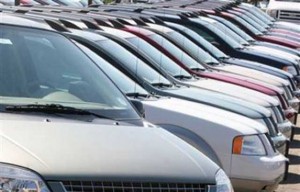
While car sales were slowed up due to winter weather in some parts of the country, buyers paid more for their vehicles in January.
Despite the chill that last month’s blizzard delivered, automakers managed to shovel up record revenues in January, while consumers paid near-record amounts for the vehicles they purchased.
New vehicle buyers paid a collective $38 billion last month, the 25th consecutive month of year-over-year gains, according to tracking firm TrueCar. And while average transaction prices also jumped, they fell a bit short of the previous record, analysts noted.
“Growing transaction prices reflect growing consumer preference in trucks and SUVs,” said Tim Fleming, an analyst with Kelley Blue Book. “Consideration in thse segments also is helped by the country’s lowest gas prices since 2009, a trend which is expected to last through year-end.”
Different analysts offered up slightly different figures, but the trends were clearly moving in the same direction. According to KBB, average transaction prices, or ATPs, jumped $919, or 2.8%, over the past 12 months, to $34,112. TrueCar put the year-over-year increase at $551, or 1.7%, to $33,155. The difference reflects the way the two firms track data. Both agreed that ATPs dipped slightly from December 2015.
(Tough weather puts chill on U.S. auto sales in January. For more, Click Here.)
That may be a fluke reflecting the shortfall on the truck side at several import manufacturers, notably Honda and Toyota, who both saw sales dips that reflected a shortage of crossover-utility models. Look for the month-to-month upward trend to resume going forward.
“We continue to see a trajectory in new vehicle transaction prices,” said Stacey Doyle, TrueCar’s senior industry analyst. “Non-premium utility vehicles will help spur the growth this year, with a 4.3 percent increase, bringing full-year industry ATP to the $34,000-level for the first time.”
The bigger the truck, the bigger the increase, according to KBB data. Buyers paid 5.9% more, year-over-year, for full-size pickups, and 6.3% more for full-size utility vehicles.
Perhaps counterintuitively, transaction prices rose slightly for electric vehicles. At an average $38,107, they were 1.3% more expensive than in December and 0.1% more than in January 2015.
(Click Here to find out when a Saab is not a Saab.)
Only a handful of makers saw ATPs dip in January 2016. The biggest hit came at Volkswagen which has been struggling to offset the negative publicity surrounding its diesel emissions cheating scandal. Buyers shelled out about 4% less than a year ago, and the brand’s most popular model dipped to $20,900, a 7.9% reduction.
“Four months after the diesel emissions issue, Volkswagen Group continues to face challenges in the market, and transaction prices took a hit in January,” said KBB’s Fleming.
Another surprise was the sharp jump in rebates and other incentives at a time of record industry sales. Givebacks rose, on average, 13.4% compared to January 2015, to an average $2,932, but they dipped 4.2% compared to December.
(To see more about the new record for global auto sales set last year, Click Here.)
Volkswagen was one reason for the increase. In part to keep diesel buyers from fleeing while those products are temporarily unavailable, VW has loaded up the givebacks which rose an average 48% compared to January 2015. General Motors, BMW, Toyota and Fiat Chrysler also had double-digit increases. Daimler AG, parent of Mercedes-Benz and Smart, was one of the few to reduce January incentives, along with Kia and Subaru.

And sticker pries will be jumping more every year as consumers are forced to pay thousands per year for the EPA/Obama decree of 54.5 mpg CAFE and to subsidize the cost of personal transportation EVs for the tree hugger’s who refuse to subsidize my ULEV 2 daily driver.
Here’s a flipside, GT…one of the reasons for the plunge in fuel costs has been the sharp decline in fuel consumption compared to what our cars would be burning in decades past. The less we burn, the bigger the supply, the harder it becomes for OPEC, Russia, Exxon, et al, to drive up fuel prices.
Paul E.